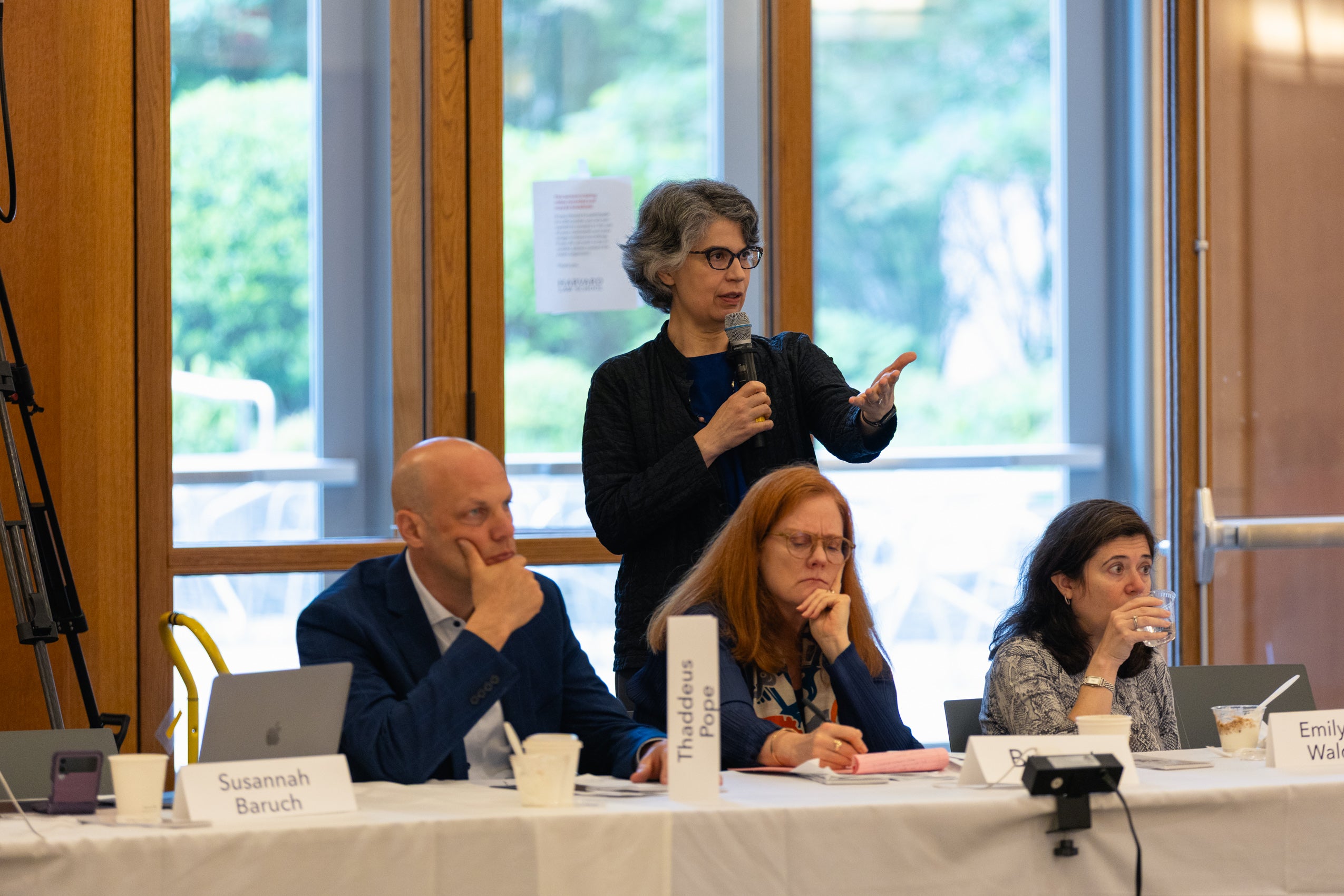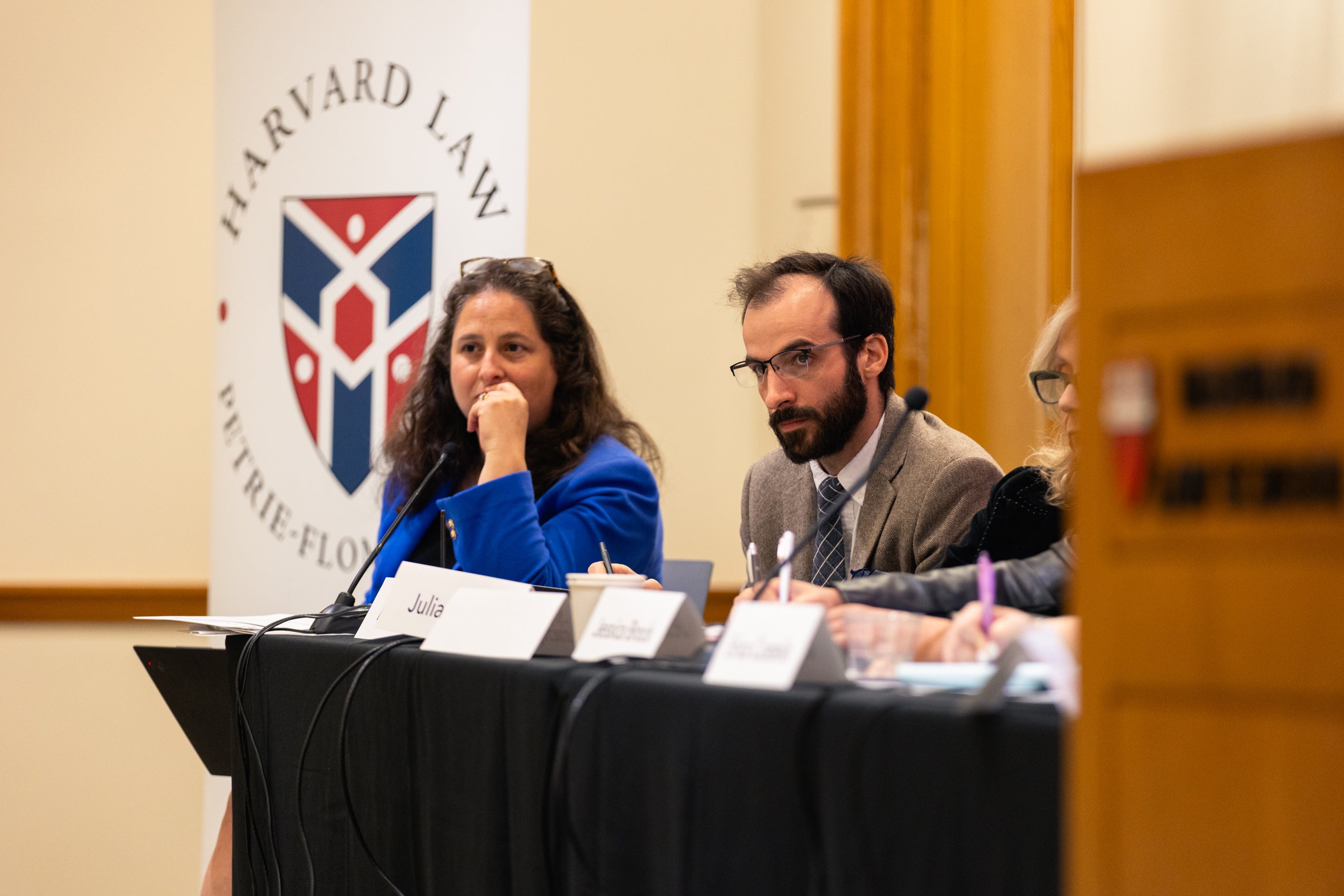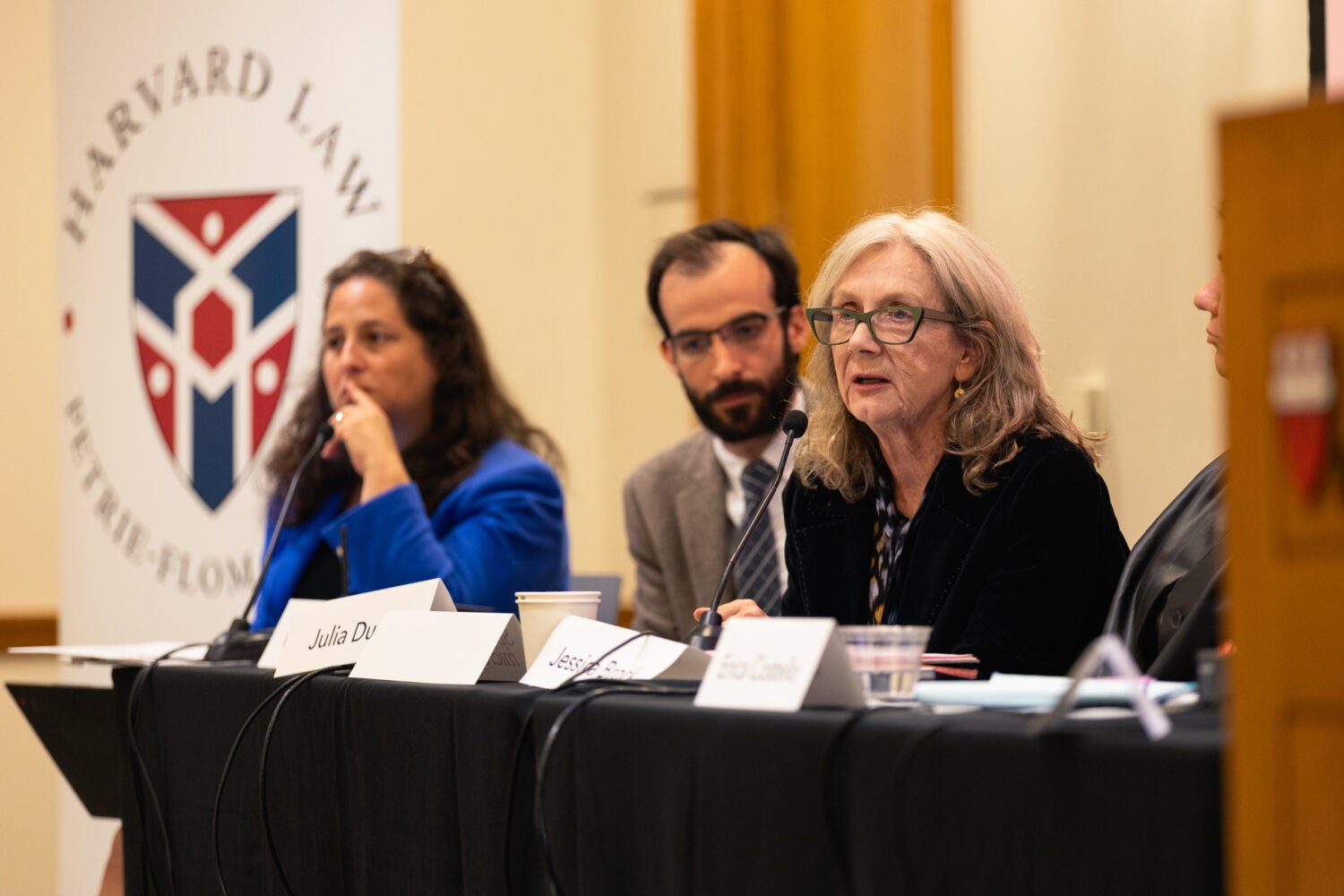Americans are getting older — fast. Unfortunately, so are many U.S. laws and regulations involving healthcare, autonomy, and our support systems, argued experts at an event held by Harvard Law School’s Petrie-Flom Center for Health Law Policy, Biotechnology, and Bioethics on June 9.
“We know that our healthcare systems and the social safety net is strained, facing growing costs, as are family caregivers, who find themselves caring for multiple generations, and patients have increased complexity as they experience longer lifespans,” said I. Glenn Cohen ’03, faculty director of the center and the James A. Attwood and Leslie Williams Professor of Law, in prepared introductory remarks.
According to demographers, by 2030, one in five Americans will be age 65 or older. But our medical and political structures have not always kept pace with rapid changes in knowledge about longevity and the way we age, Cohen said.
During a daylong conference, Cohen and Petrie-Flom Executive Director Susannah Baruch welcomed three dozen scholars from the law, medicine, and bioethics, who debated the implications of aging brains and bodies on the law. The panelists discussed difficult questions about capacity and decision-making in patients with cognitive decline, discrimination and paternalism, technology, and the very meaning of age itself. Above all, the experts wondered, as advances in medicine enable people to live longer lives, how might our legal systems adapt to ensure dignity and well-being for all?
The first panel centered on the ways in which the law can better support the ability of people with cognitive decline to retain personal agency when making decisions about them or their care. To start, argued Leslie Francis, a professor at the University of Utah, our systems need to be less rigid.
Presenting a paper she wrote with Michael Ashley Stein ’88, a visiting professor at Harvard Law and executive director of the Harvard Law School Project on Disability, Francis explained that the pair hoped to provide guidance on how to draft state statutes that allow people with dementia to make individualized choices about their future decision-making.
The concept of creating a general rule that allows for flexibility to address different peoples’ needs at different times may seem like a paradox, Francis acknowledged. But such an approach is necessary to respect the autonomy of individuals experiencing cognitive decline, she argued.
Current state laws about living wills, advanced directives, powers of attorney, and surrogate decision-making are often “one-size-fits-all,” Francis said. For instance, she added, “It may be that there isn’t, in a state, good provision for situations in which people have some capacities, but don’t have others to the fullest extent.”

But she and Stein envision another way: laws crafted to enable people to express their values and preferences on issues such as their finances or medical care while they still have the capacity to do so. “What we’re trying to do is create legal devices that enable people to tailor the kind of decision-making they would like to have when, or if, their capacity declines.”
Because of the explosion in medical knowledge about neurological disorders, Francis said, we are better equipped to predict what decline might look like for specific conditions. With this information, people could plan for future decision-making that considers the cognitive and behavioral changes they might experience.
There are many ways to do this, Francis said, but one suggestion she and Stein propose is to “invite individuals to specify differently, if they so wish, for different kinds of anticipated situations.”
For example, a person could indicate when they would want to transition from supportive decision-making — that is, choices made with the help of a trusted individual — to a more hands-off approach, such as transferring one’s power of attorney.
People are unique, and so, Francis said, “individuals might want different arrangements depending on their circumstances.”
Building on existing protections
Legal capacity was also on the mind of Hezzy Smith, director of advocacy initiatives for the Harvard Law School Project on Disability.
In his talk, Smith probed how the United Nations Convention on the Rights of Persons with Disabilities might inform an effort to negotiate a similar treaty for older people, particularly when it comes to issues of cognitive impairment.
“Invariably,” Smith said, “because the disability rights movement made it into the international human rights governance framework before older persons, some of the lessons around legal capacity and how to balance the competing interests around how to deal with issues of diminished capacity, are going to be informed by the developments with regard to folks with disabilities.”
Capacity was the most controversial topic among countries during negotiation of the convention on the rights of people with disabilities, Smith said. Countries were hesitant to rework their laws in this area.

The treaty’s protections for decision-making have indeed turned out to be strong, he added. “It made very clear that people with disabilities have been subject to egregious human rights violations as a result of legal capacity restrictions,” he said.
The agreement adopts what some call a “universalist approach to legal capacity,” Smith continued. It “asserts that every person with disability has legal capacity and has a right to exercise that legal capacity, and importantly, to receive all the supports they need in order to make that happen.”
Governments may be wary that the treaty on the rights of older people might require similarly large changes. But in Smith’s view, there is another option, one that doesn’t view people as simply having — or not having — legal capacity.
Instead, Smith pushed advocates to consider including “a clearer lane carved out for delegated decision-making.” Instead of “maximizing the protections of the decision-making process” itself, Smith said, they might focus on “right outcomes” — that is, getting to better results.
Emerging issues in clinical care
A second panel centered on how our growing lifespans affect the provision of medical care. One paper, co-written by Cohen, the Petrie-Flom Center’s faculty director, with Mattia Andreoletti and Alessandro Blasimme, both lecturers in the Department of Health Sciences and Technology at ETH Zurich, focused on when it might be appropriate to use biological age in care settings.
Although people are living longer lives than ever, this additional longevity is not evenly distributed across the globe, Blasimme explained. And on an individual level, he added, “different people age at different rates, meaning that people that are born in the same year might exhibit very different characteristics in terms of how they are able to conduct activities of daily living, and also with respect to morbidity and mortality risks.”
One way to make sense of the difference in health and lifespans is biological age, Blasimme suggested. Unlike chronological age, which is easily determined using a person’s birthday, determining a person’s biological age is tricky, and there are several methods of doing so. Generally, these models use cellular and subcellular changes to come up with a calculation that “describes the delta [difference] between the expected and the actual state of a person,” he said.
Blasimme explained that his coauthors explore in their paper whether or when — presuming biological age calculations are accurate — it is ethical to use biological age instead of chronological age for certain medical decisions, such as the appropriateness of a treatment for a particular patient.
“Age is already being used in medical practice and also in public health,” he said, pointing to the criteria used in organ transplantation as just one example.
The answer to this question is important because, although biological age may tell us more about a person’s health than their chronological age, it can also “reproduce or amplify bias,” with disadvantaged groups often having a higher biological age than expected, Blasimme said. And biological age is also more malleable, he added: Lifestyle changes and even drugs can affect it.
AI and aging
The conference concluded with panels focused on discrimination and paternalism, and on the ways technology and commercialism are and will affect aging in the U.S.
Artificial intelligence is increasingly playing a role in how care is delivered and paid for, according to Barry Solaiman, the associate dean for academic affairs and an assistant professor of law at Hamad Bin Khalifa University.
Solaiman’s paper, written with Abeer Malik LL.M. ’25, examined the use of AI in Medicare Advantage plans. The pair looked specifically at prior authorization, or the requirement by an insurance company that it must approve a treatment or service before a patient may receive it.
AI is typically deployed in this context as a cost-control measure, Solaiman said, because Medicare Advantage insurers are paid per enrollee, not per procedure.
“Once we bring AI into this scene in prior authorization, AI tools are being used by insurers to determine what care gets approved,” he said. “The process therefore becomes opaque, because we can’t really know why AI is making these decisions, and these systems have been built to control costs within that greater structure that already exists.”
The risk is that medical decisions are increasingly made not by clinicians, but by algorithms, Solaiman said.
Solaiman and Malik’s research looks at several recent lawsuits against insurers using AI in prior authorization disputes. While most decisions until now have tended to involve tort law, Solaiman explained that he and Malik were interested in recent cases that have utilized novel strategies involving securities law and contract law. “This is not something I’ve seen being anticipated that would become sort of an avenue for court cases, for making determinations in the space.”
What is generally still missing, however, according to Solaiman, are claims that invoke civil rights law. “Issues of AI bias aren’t squarely addressed,” he said. “The civil rights law in this space hasn’t caught up, and there has to be some sort of development in this area.”
One potential solution to ensure more fairness when AI is used, Solaiman said, might be for courts to compel the disclosure of algorithmic logic and use. Another might be to prevent an algorithm from being allowed to supplant “nuanced medical judgment.”
“Both courts and regulators have roles to play in closing these gaps,” Solaiman argued.
Want to stay up to date with Harvard Law Today? Sign up for our weekly newsletter.
